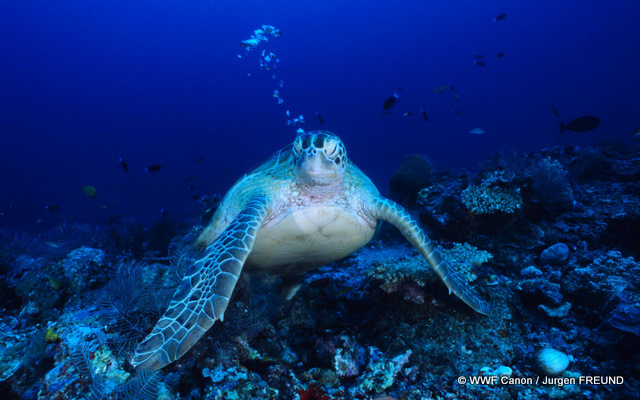Over one hundred participants from 22 countries gather today at the second Coral Triangle Fishers Forum (CTFF) to address Illegal, Unregulated and Unreported (IUU) fishing in the region.
The forum will be held at the Novotel Conference Centre, Lami Bay, Suva from the 18th to the 20th of June, 2012.
“The CTFF is an opportunity for fisherfolk to develop practical solutions and gain a common ground in achieving sustainable and equitable fisheries by providing a regular platform for fishers, processors, buyers, government officials, and other stakeholders to gain perspective and learn more about the issues that affect them,” said Kesaia Tabunakawai, WWF South Pacific Programme Office Representative.
“The problem of IUU was in fact recommended by participants in the last forum to be the focus this year,” added Ms. Tabunakawai.
IUU fishing is one of a range of factors that is putting fish stocks in the Coral Triangle and Pacific region – the source of more than 60% of global marine capture production and a critical source of income for millions of fisherfolk – at risk.
It is estimated that several million tonnes of fish are taken by IUU fishing each year in the Asia-Pacific, representing a significant portion of the total catch from the Pacific Ocean.
Addressing IUU fishing in the region is both a regional and global imperative.
Hosted by WWF and the Ministry of Fisheries and Forests of Fiji, this 3-day forum brings together regional stakeholders, especially local fishers and industry representatives, to identify strategies and models for effective partnerships on seafood traceability, reducing IUU fisheries, and achieving long-term sustainability and food security in the seafood sector.
Using practical examples of new and effective traceability approaches such as catch documentation systems, solution models, and other innovative ideas will be identified and discussed.
“The solutions, innovative ideas, and consensus recommendations developed at the CTFF can then be brought to national governments and regional fisheries management bodies, whose decisions have a direct impact on the long-term sustainability of fisheries in the region and the people that depend on them,” Ms. Tabunakawai added.
“By identifying what has worked and what has not in combating IUU, the forum will help expand and scale up effective solutions to the persistent problem of IUU in fisheries,” said Keith Symington, WWF Coral Triangle Strategy Leader.
“This will help fishers and seafood companies improve the long-term viability of fishing communities and reduce impacts from fisheries in the Coral Triangle region.”
The Coral Triangle is one of the most biodiverse marine regions on the planet—containing more than 3,000 species of reef fish, many of which feed the world’s appetite for seafood, fuels thousands businesses, and supports millions of people in terms of food and income.
Quick Facts:
§ The Coral Triangle—the nursery of the seas—is the world’s center of marine life, encompassing around 6 million sq km of ocean across six countries in Asia-Pacific – Indonesia, Malaysia, Papua New Guinea, Philippines, Solomon Islands, and Timor-Leste.
§ It is home to 76% of the world’s known coral species, 37% of the world’s coral reef fish species, and commercially-valuable species such as tuna, whales, dolphins, rays, sharks, including 6 of the world’s 7 known species of marine turtles.
§ The Coral Triangle directly sustains the lives of more than 120 million people and contains key spawning and nursery grounds for tuna. Its reef and coastal systems also underpin a growing tourism sector.
WWF is working with governments, local communities, businesses, and consumers to promote sustainable development in this region.
For information on Coral Triangle go to: www.panda.org/coraltriangle














